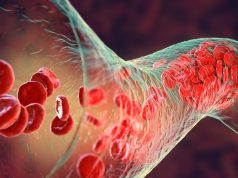In patients with intermediate or low thrombotic risk tumor types, non-O blood type linked to increased VTE risk
THURSDAY, April 21, 2022 (HealthDay News) — Non-O blood type seems to be a time-dependent predictor of venous thromboembolism (VTE) in patients with newly diagnosed or recurrent cancer, according to a study published online April 13 in Blood Advances.
Cornelia Englisch, from the Medical University of Vienna in Austria, and colleagues conducted an analysis within the Vienna Cancer and Thrombosis Study, including patients with newly diagnosed or recurrent cancer, to examine the influence of ABO blood type on cancer-associated VTE risk. The analysis included 1,708 patients, followed for a median of 24 months.
Overall, 151 patients (8.8 percent) developed VTE. The researchers observed no association between non-O blood type and VTE risk during the first three months of follow-up (subdistribution hazard ratio [SHR], 1.00; 95 percent confidence interval, 0.60 to 1.67). Thereafter, a significant association was seen for non-O blood type and VTE risk (SHR, 1.79; 95 percent confidence interval, 1.12 to 2.85). In patients with intermediate and low thrombotic risk tumor types, non-O blood type was associated with higher VTE risk (SHR, 1.73; 95 percent confidence interval, 1.09 to 2.73), but no significant association was seen in very high-risk types (pancreatic, gastroesophageal, and brain cancer; SHR, 0.94; 95 percent confidence interval, 0.55 to 1.61). After adjustment for factor VIII, this association was weakened.
“ABO blood type group is an easily accessible VTE predictor that can help in the clinical practice during risk assessment in patients with cancer,” the authors write.
Copyright © 2022 HealthDay. All rights reserved.








